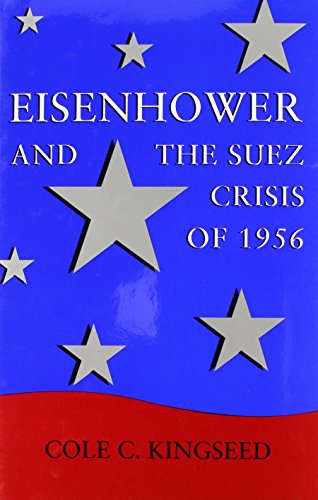Eisenhower and the Suez Crisis of 1956
Kingseed, Cole C.
About the Book
Description:
Pages can have notes/highlighting. Spine may show signs of wear. ~ ThriftBooks: Read More, Spend Less 1.1. Seller Inventory # G0807119873I3N00
About this title:
Synopsis: Historian Cole C. Kingseed reinforces the revisionist perspective on Dwight D. Eisenhower's presidency in this study of one of the major foreign policy challenges of Eisenhower's administration: the Suez crisis of 1956. Kingseed's principal focus is on the president - what he did and why and how he did it. Discussion of the Middle East situation forms the backdrop against which to analyze Eisenhower as chief executive.
Forgoing late-twentieth-century hindsight, Kingseed evaluates Eisenhower's managerial performance according to what the president knew at the time. As much as possible, he relies on the president's own diary, his private letters and memoranda, his official correspondence, Department of State records, minutes of the National Security Council and cabinet meetings, presidential secretary Ann C. Whitman's diary and journals, written records and personal correspondence of staff secretary Andrew J. Goodpaster, and a wide array of oral histories.
What Kingseed reveals about Eisenhower's command of the White House during the Suez crisis reflects his executive abilities generally: Eisenhower was at the center of events, organizing the security departments within the federal government in such a manner that it was only at the presidential level that all aspects of strategy and policy coalesced. In devising and implementing long-term policy, he utilized more formal bodies, such as the National Security Council, but for matters that required personal and immediate attention, he convened an ad hoc group of special advisers.
A major premise of Kingseed's analysis is that the method in which a president organizes and supervises the decision-making apparatus has a profound impact on the attainment of political goals. That Eisenhower, in responding to the Suez crisis, achieved his policy objectives amid dissenting allies, contentious military chiefs, and political opposition in a presidential election year clearly demonstrates, according to Kingseed, the unique, flexible leadership style of an extraordinarily active - and effective - chief executive.
About the Author:
Bibliographic Details
Title: Eisenhower and the Suez Crisis of 1956
Publisher: LSU Press
Publication Date: 1995
Binding: Hardcover
Condition: Good
Dust Jacket Condition: No Jacket
